Are you searching for information about garage floor crack repair? If so, you’ve landed on the right page. The key to figuring out the correct garage floor crack repair method starts with determining what type of crack you’re looking at. Once you’ve figured out the cause of the crack, you can choose an appropriate repair solution. This blog post will discuss the different types of garage floor cracks, their causes, garage floor crack repair methods, and more.
Types Of Cracks In A Garage Floor And What Causes Them
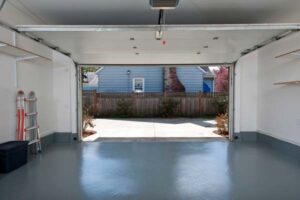
Garage floors crack for various reasons. The most common are shrinkage, structural problems, and craze cracking. Understanding the type of crack you’re dealing with is essential for finding the correct repair solution.
Shrinkage cracks in a concrete garage floor
These cracks are hairline and caused by shrinkage during the concrete curing process. They’re very common, and while they may be unsightly, they don’t affect the garage’s structural integrity. They can be sealed using epoxy or polyurethane foam.
Cracks in a concrete garage floor caused by differential foundation settlement
These cracks are larger, and you may notice that one side of the crack is higher than the other. We say that these types of cracks are “structural” because they affect the garage’s structural integrity. They are usually caused by differential foundation settlement. This is when a foundation settles into the ground unevenly. Differential settlement puts a lot of stress on a foundation and can lead to severe structural issues.
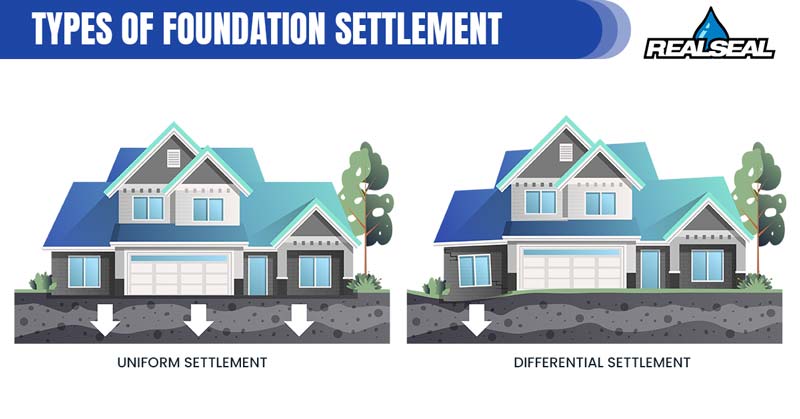
Differential foundation settlement is caused by various things, including the following:
- Expansive clay soil that swells as it soaks up moisture and then shrinks as it dries out. This swelling-shrinking cycle (usually seasonal) creates movement in the ground under the foundation, and over time this can lead to foundation settlement.
- Erosion-prone soil, along with poor drainage, can cause voids to form under the foundation. If the foundation sinks into the voids, you’ll have differential settlement, which could cause cracks in a garage floor.
- The freeze-thaw cycle can also cause differential foundation settlement because as the soil freezes, it expands and pushes up on the foundation. When it thaws, the foundation settles back down. Over time, this can cause settlement.
- Differential foundation settlement can also be caused by soil that wasn’t correctly tamped down before construction began. When this happens, the foundation will settle into the ground after it’s built, usually unevenly.
Garage floor cracks caused by improperly prepared soil
Before the garage floor is built, the soil needs to be correctly tamped down. If this isn’t done, the floor could settle into the ground after it’s built, and this could cause cracking.
Craze cracking in garage floors
Craze cracking in concrete is caused when the top layer of the concrete shrinks faster than the layers underneath. When this happens, a network of tiny cracks called crazing can form on top of the concrete. They aren’t structurally significant, but they are unsightly. Crazing is caused by various things, including inadequate curing, a mix that’s too wet, and problems with finishing.
Garage Floor Crack Repair Methods
The right garage floor crack repair method depends on the type of crack. Garage floor cracks caused by shrinkage during the concrete curing process are not repaired in the same way cracks caused by differential foundation settlement are.
Repair options for cracks caused by shrinkage
The best way to fix concrete cracks caused by shrinkage is to clean the crack and fill it with a flexible sealant. This sealant can be applied by hand or with an applicator gun, depending on how wide the crack is. After applying the sealant, use a putty knife or other tool to smooth it over and make sure there are no gaps or air bubbles. Finally, let the area dry before walking on it again.
For more information see What is the Difference in Epoxy and Polyurethane in Concrete Crack Injections?
Repair options for garage floor cracks caused by differential foundation settlement
Differential foundation settlement is usually repaired via underpinning with push or helical piers. Underpinning involves extending the foundation down to soil that’s able to support it. The process is minimally-invasive, and once the piers are in place and the foundation is raised to maximum practical level, this usually fixes the crack.
Repair options for cracks caused by improper soil preparation
If the cracks are due to settlement of the slab caused by improperly tamped soil, polyjacking would be the best repair solution. Polyjacking involves injecting polyurethane foam under the slab to lift and level it. The cracks can then be sealed.
Repair options for garage floor crazing
There really is no repair option for garage floor crazing. The cracks are not structurally significant, and covering them with a sealer could actually make them stand out more.
Carbon Fiber Staples
Along with piering (for differential foundation settlement) or polyjacking (for settlement of the garage floor only), carbon fiber staples (also called grid stitch crack repair) can be installed in garage floors to help hold shifting slabs together.
Is DIY Garage Floor Crack Repair A Good Idea?
The answer to this question largely depends on the type of crack and your level of expertise. While shrinkage cracks are usually easy to patch using simple tools and readily available repair kits, structural cracks caused by differential foundation settlement require an experienced foundation repair contractor. Therefore, if the crack is structurally significant and caused by foundation settlement, a DIY repair to correct the appearance of the crack won’t be a lasting solution. It will be, at best, a temporary fix to make the crack less visible.
If you’re not absolutely sure what type of crack you’re dealing with, contact an experienced foundation repair contractor and ask for an evaluation. Structural cracks get worse over time and if you wait, you’ll end up paying more for the repair.
If you’re looking for garage floor crack repair in Chicagoland, contact The Real Seal today to schedule an evaluation and receive a repair estimate.
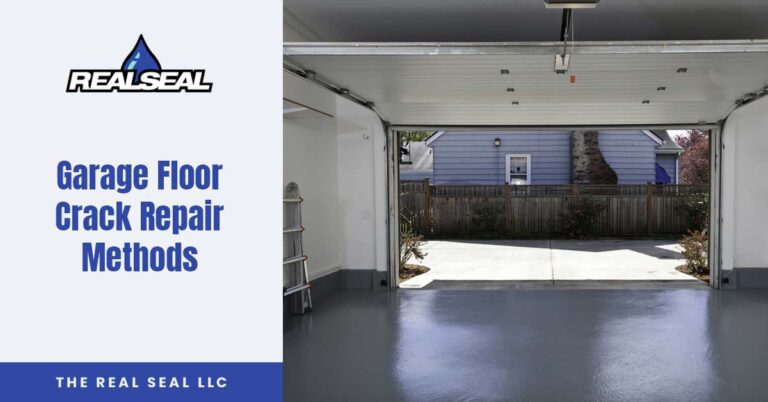
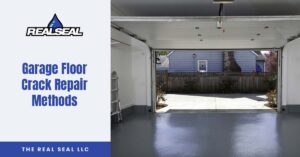
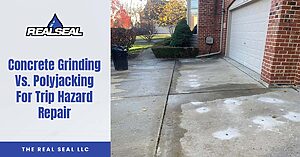
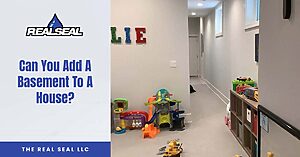
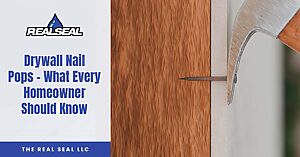
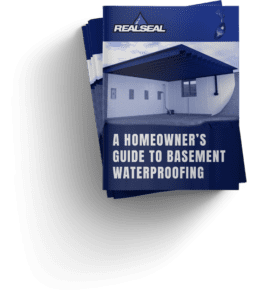

8 Responses
Can you provide me with a detailed explanation of your service?
We have many services. Best thing to do is continue on our website http://www.TheRealSeal.com and explore the different services we have. There are How We Do It Videos on all services, as well as robust pages explaining the processes, warranties, and costs.
Great post! I never realized there were so many different methods for garage floor crack repair. The step-by-step guide was especially helpful. I’m definitely going to try the epoxy method for my garage. Thanks for sharing!
You bet, we’re here to educate!
Great insights on garage floor crack repair! I never knew there were so many methods available. I’m definitely considering the epoxy injection technique for my garage. Thanks for sharing!
Thank you and happy to help!
Great tips on garage floor crack repair! I didn’t realize how important it is to properly clean the area before applying the filler. Can’t wait to try the epoxy method you mentioned – seems like it will provide a long-lasting solution. Thanks for sharing!
It certainly is and you’re very welcome!